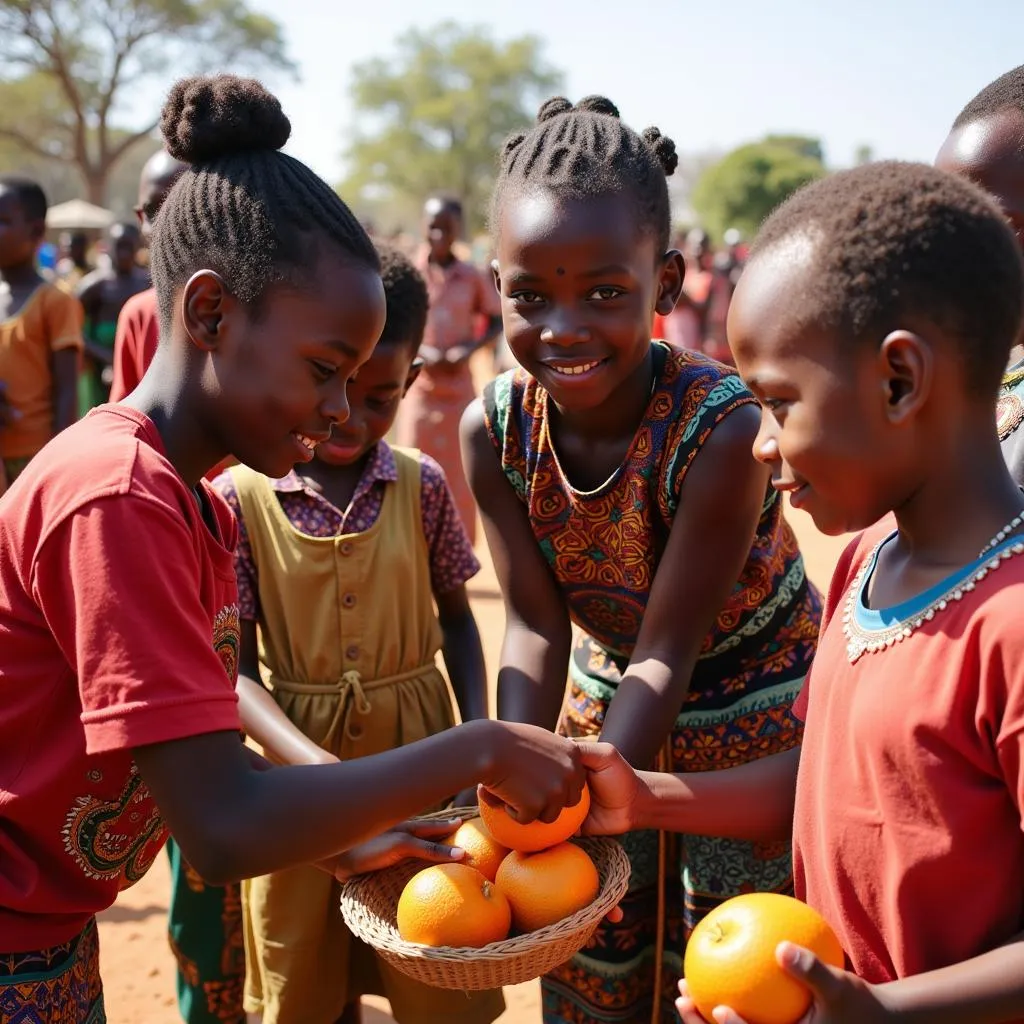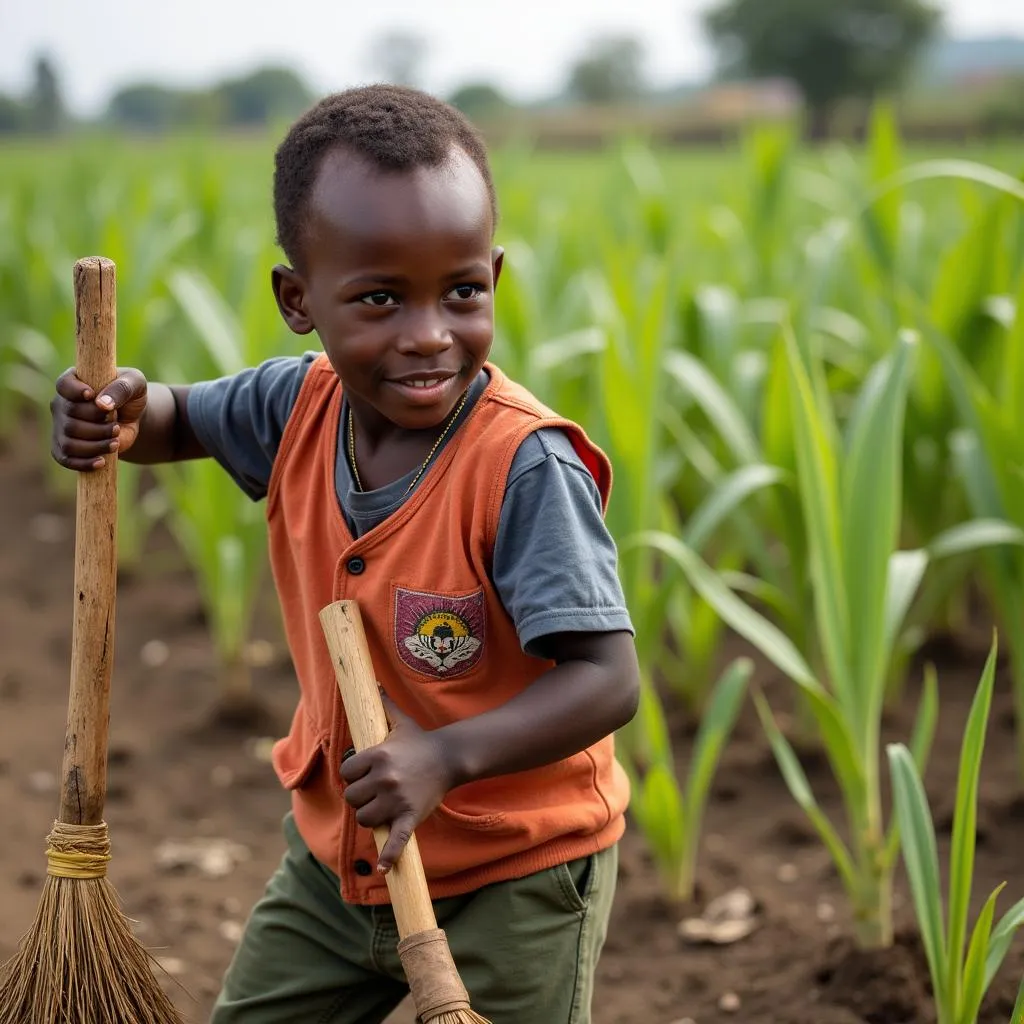African Kid Moral: Lessons in Life, Culture, and Values
African children are raised within a rich tapestry of traditions, values, and beliefs that shape their character and guide their actions. These moral teachings, passed down through generations, provide a framework for navigating life’s challenges and fostering a sense of community.
The Power of Ubuntu: A Universal Guiding Principle
At the heart of many African cultures lies the concept of Ubuntu, a philosophy emphasizing humanity, interconnectedness, and shared responsibility. It encourages individuals to see themselves as part of a greater whole, fostering compassion, empathy, and respect. This principle is ingrained in the upbringing of African children, shaping their understanding of how to interact with the world around them.
“I am because we are”: The Importance of Community
The phrase “I am because we are” encapsulates the essence of Ubuntu. It signifies that one’s identity is inextricably linked to the well-being of the community. Children are taught to value family, friends, and neighbors, understanding that their actions impact those around them. This creates a strong sense of belonging and shared purpose.
 Children learning the importance of community in an African village
Children learning the importance of community in an African village
Respect for Elders: A Cornerstone of African Culture
Respecting elders is paramount in many African societies. Children are taught to show deference to their parents, grandparents, and other senior members of the community. This reverence extends to all those who are older, reflecting a deep-seated understanding of wisdom gained through experience.
Learning from the Past: Passing Down Tradition and Knowledge
Respect for elders is not merely about outward gestures but about recognizing the importance of preserving cultural heritage. Children are encouraged to learn from the stories, proverbs, and traditions shared by older generations. This knowledge transmission allows them to connect with their ancestors and understand the values that have sustained their community for centuries.
The Value of Hard Work: A Pathway to Success
African children are often raised with an understanding that hard work is essential for success. Whether it’s helping with household chores, tending to the family farm, or pursuing educational goals, they are taught to strive for excellence and perseverance.
 Children working alongside their parents on a farm in Africa
Children working alongside their parents on a farm in Africa
Sharing and Generosity: The Essence of African Hospitality
Sharing and generosity are core values in many African cultures. Children are raised to be hospitable, welcoming guests with open arms and offering them food and shelter. This spirit of sharing extends beyond material possessions, encompassing kindness, empathy, and a willingness to help those in need.
The Art of Giving: Cultivating a Caring Heart
Sharing and generosity are not simply acts of kindness; they are integral to building strong communities. By learning to share and help others, children develop a sense of compassion and social responsibility. These traits are essential for creating a harmonious and supportive environment for everyone.
Conclusion: A Legacy of Values
African Kid Morals are a powerful testament to the enduring values that have shaped generations. From the principles of Ubuntu to the importance of respect, hard work, and generosity, these teachings provide a framework for navigating life’s complexities and building a better future for themselves and their communities.
FAQ
1. What are some common African proverbs that reflect moral values?
African proverbs are rich in wisdom and offer practical insights into life. Some common proverbs that reflect moral values include: “A child is a visitor in your house,” emphasizing responsibility and care for children, and “It takes a village to raise a child,” highlighting the importance of community support.
2. How do African cultures celebrate and recognize children’s achievements?
African communities celebrate children’s milestones and achievements with vibrant ceremonies, songs, and dances. These celebrations reinforce the importance of education, family values, and community pride.
3. How do African cultures handle conflict resolution?
Conflict resolution in African cultures often emphasizes dialogue, negotiation, and mediation. Community elders and respected figures often play a crucial role in resolving disputes peacefully.
4. What role does storytelling play in shaping African kid morals?
Storytelling is a vital part of African culture, transmitting traditional knowledge, values, and moral lessons. Stories, proverbs, and folktales provide children with guidance on how to behave ethically and navigate life’s challenges.
5. What are some ways to learn more about African kid morals?
There are many resources available to explore African kid morals, including books, documentaries, online articles, and cultural exchange programs. Engaging with these materials can provide valuable insights into the rich tapestry of African values.
6. How can we encourage the preservation of African kid morals?
We can support the preservation of African kid morals by engaging with cultural organizations, promoting intergenerational dialogue, and highlighting the importance of these values in educational settings. By valuing and sharing these traditions, we can ensure their continued relevance and impact on future generations.
